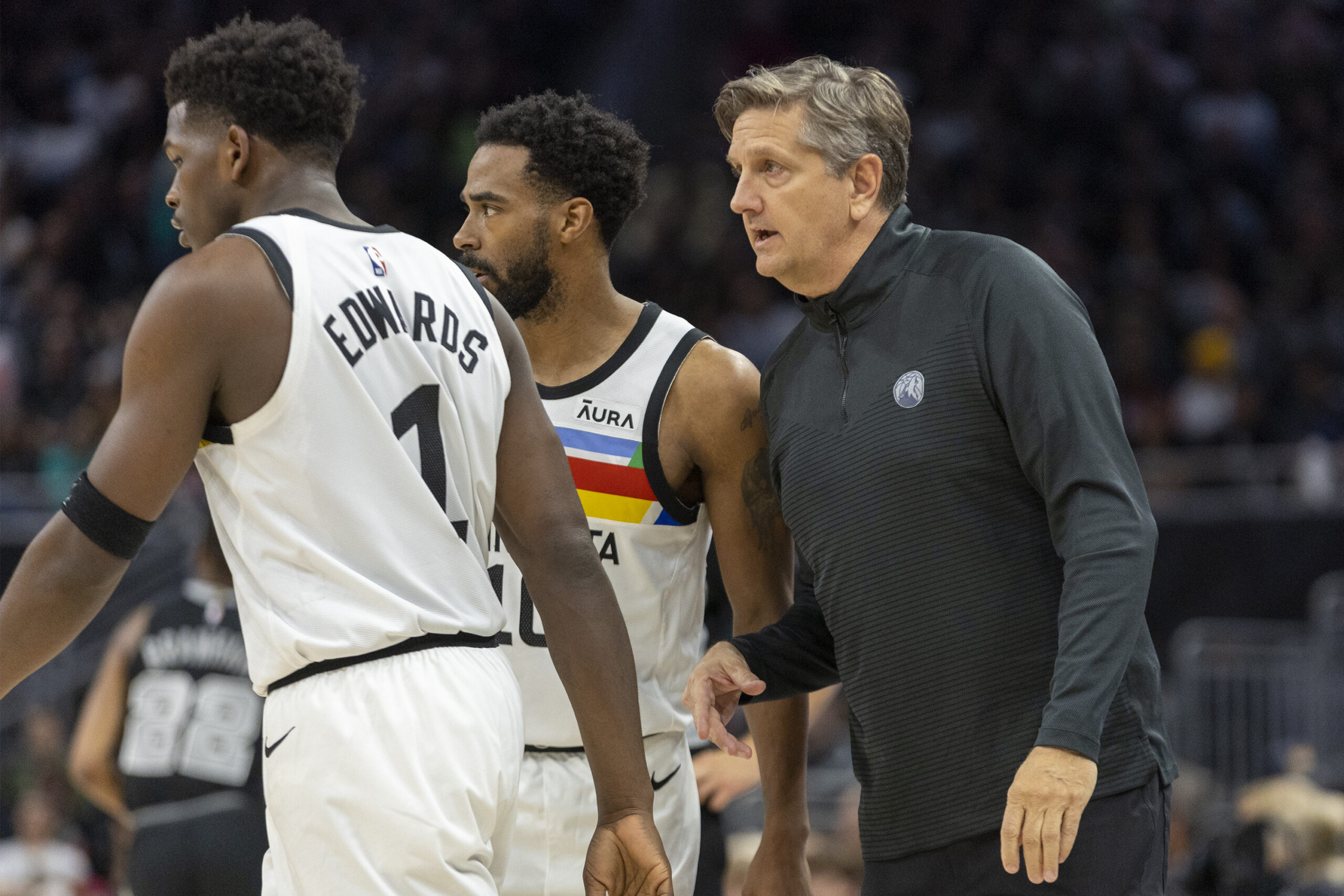
FILE – Minnesota Timberwolves head coach Chris Finch, right, speaks with guards Mike Conley, center, and Anthony Edwards, left, during the first half of an NBA basketball game against the San Antonio Spurs, Saturday, April 8, 2023, in Austin, Texas. (AP Photo/Stephen Spillman, File)
MINNEAPOLIS— With about three minutes left on the pregame warmup clock, the back hallway at Target Center that leads to the arena floor comes alive with the boisterous and motivational sounds of team camaraderie.
The Minnesota Timberwolves convene for a brief cacophony of hollers, shoulder shoves and hand slaps like they’re still in high school before walking to the court together. The twist? This human energy drink is concocted by the coaches, not the players.
“Getting revved up!” said 64-year-old assistant coach Elston Turner, wryly smiling through his reflection on the ritual after a recent practice.
READ: NBA: Suns top Timberwolves as both teams set up first round clash
With the staff lined up on both sides, head coach Chris Finch walks calmly through the tunnel for fist bumps as the rest of the assistants let loose. Former quality control coach Nathan Bubes, who’s now with the G League affiliate in Iowa, was originally responsible for the ruckus. He’d follow Finch through the good-natured gauntlet while encouraging a friendly-but-firm smack from his colleagues. Bubes’ successor, Jeff Newton, has literally elevated the role with leaping body bumps for the other assistants.
“It gives you a moment of a little bit of levity, but also a little bit of getting everybody ready to go,” assistant coach Micah Nori said. “We look forward to it.”
This well-assembled staff has been a welcomed asset for a 35-year-old franchise that hasn’t had many of them, one of many strengths the Timberwolves bring to the NBA playoffs this spring as the No. 3 seed in the Western Conference. Finch is a strong contender for the Coach of the Year award after steering the Timberwolves to a 56-26 record that marked the second-best in club history.
The Minnesota Timberwolves coaches led by head coach Chris Finch, center, look on during the first half of an NBA basketball game against the Phoenix Suns, Sunday, April 14, 2024, in Minneapolis. (AP Photo/Matt Krohn)
“They’ve been really detailed on what we need to do in order to accomplish things,” veteran point guard Mike Conley said. “They put it on the table, and we all know what we need to do.”
Minnesota hosts Phoenix on Saturday in Game 1 of the best-of-seven first-round series.
“We all know we have jobs to do. What I appreciate is the way it is divvied up. We sit in a meeting sometimes, and there’s 15 people in there. I mean, come on now,” said Turner, who previously worked with Finch in Houston. “Everybody has something to do. We talk about it, like in a football huddle, and then we break out and everybody does their part. Finchy doesn’t really look over your shoulder. He hired you for a purpose, and he allows you to do it.”
READ: NBA: Timberwolves jump on Lakers minus LeBron James, Anthony Davis
The Suns, with superstars in Devin Booker and Kevin Durant and a prolific scorer in Bradley Beal, prefer to play small and lean on their shooters. They won all three regular-season matchups with the supersized Wolves, holding a double-digit lead for the entire second half each time, including last Sunday.
With six days to prepare, Finch’s crew has been busy this week.
“That’s a lot of fun. It’s a coach’s dream, really. You get a chance to pick it apart,” Finch said. “It feels like a football game.”
Nori is the basketball equivalent of a bench coach in baseball, Finch’s confidant who helps keep the entire operation light — and moving. Turner takes the lead on defensive strategy. Pablo Prigioni is essentially the offensive coordinator, directing Finch’s free-flowing system. Kevin Hanson, Corliss Williamson, Joe Boylan and a host of others round out the group.
“The chemistry on the staff is really high. It’s at the point where at halftime, a lot of times I don’t even talk to the defensive guys. They kind of know what they need to do. We’ve talked enough through the game. They’ve got their stuff ready to go. I might say one or two things I think needs to be a point of emphasis, and they’ve already got it covered,” Finch said. “Practice, everyone has their domain. I’ve got an immense amount of trust in everything these guys do, and so do the players. It’s probably one of the best and highest-functioning staffs I’ve ever been a part of, which is a credit to those guys.”
Nori, who worked with Finch previously in Denver, has marveled at the absence of paranoia that sometimes seeps into front offices and coaching staffs around the league.
“Finchy understands people. He is not afraid to tell hard truths. He’s very fair,” Nori said. “You’ll be on teams where head coaches, if the star player messes up and then they’re yelling at the other guy, are hoping that the star player gets the message he’s really sending in a roundabout way. But Finchy will hit them right between the eyes, and they respect it, and they know it’s coaching, not criticism.”